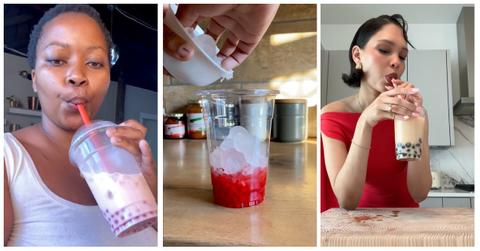A South African Forager Has Alleged That Influencer Nara Smith Is Stealing Her Content
Content creation and theft are just some of TikTok’s many flaws. Now it’s front and center with influencer Nara Smith.
Jun. 18 2024, Updated 12:48 p.m. ET
With over 7.7 million TikTok followers, it’s hard to match the influence of Nara Smith, a Mormon Lesotho-German fashion model and social media personality currently living in the United States. Nara has gone viral for her soothing and seemingly original videos playing up the “tradwife” trend as she wears glamorous and expensive clothing while cooking meals from scratch.
But content creator Onezwa Mbola, who still lives in South Africa, noticed some eerie similarities between her content and Nara’s content as of late. Onezwa has a much smaller following with almost 500,000 followers, so she’s still a force to be reckoned with. When Onezwa called out Nara, Nara’s fans came at Onezwa with a vengeance, but what’s the controversy?
The controversy between Onezwa Mbola and Nara Smith is related to Nara allegedly stealing Onezwa’s content.
One of the many things that’s troubling about TikTok is the ease with which creators can share their content and the ease with which more popular creators can then steal that content. Both Onezwa and Nara have been creating content on the platform for a long time, but they started from very different places. Onezwa forages, harvests, and “hunts” all her own ingredients, making every dish truly from scratch. Nara, on the other hand, began by just making simple home recipes.
While both are not the only ones to do what they do, viewers have started noticing direct similarities between Nara and Onezwa’s content after Onezwa shared her boba recipe and just a couple days later, Nara did the same. Fans also noticed a major shift in how Nara delivers her videos. She used to be much more congenial and uppity in her delivery, but now, she’s toned down her voice to an almost trancelike sound, reminding many of Onezwa.
In fact, Onezwa directly called Nara out in a since-deleted video that’s been reshared by Bobby Mulalo Mutswana in which she said she would be taking a break from content creation because highly paid influencers are recreating and monetizing her style of content.
While it’s hard to find a direct copy from Nara besides the boba video, when a commenter called Nara out for copying Onezwa, Nara claimed to have never seen Onezwa’s videos. However, another internet sleuth found Nara commented on one of Onezwa’s videos, saying, “Your content is so inspiring,” proving that she does, in fact, know who Onezwa is. Naturally, many of us then wonder what other truths Nara could be hiding.
People have mixed opinions on whether Nara actually copied Onezwa’s content, but it still poses greater questions about social media.
While it’s possible that Nara may not have consciously copied Onezwa, the similarities are clear. At the same time, the whole controversy has given Onezwa a lot more attention and following, and people seem to love both of their content. In a more recent video, Onezwa throws just a bit of shade toward Nara in which she said, “Nara Smith was making kale salads with lemon juice and olive oil,” to prove her point.
But influencers can change their aesthetics and engagement tactics based on what’s trending. While Nara’s new vibe might seem similar to Onezwa’s, she may also just be feeding into the more ASMR-like trend that picks up views and followers. She also started cooking from scratch when she saw videos like that were getting more views, and she has been compared to several other content creators, including Chef Tini.
As social media continues to run almost unchecked, it’s hard to say what counts as “theft” and what does not. Does sharing it on the platform mean anyone on the platform can use that style? Should all creators credit those who inspire them? Nara is clearly not a carbon copy of Onezwa, so she likely draws inspiration from a bunch of smaller influencers, including Onezwa and Chef Tini, but does that count as theft? It’s hard to say.

